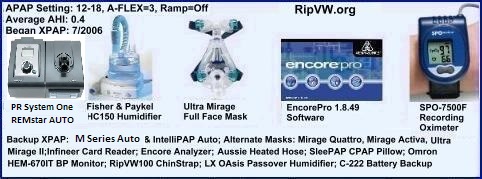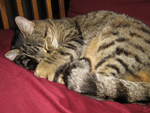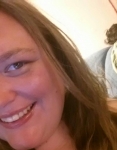Happy Sleeper,happysleeper wrote:I'm in the never got better mode still....Any suggestions from the masters?
Happy Sleeper
My first impression from your comments is that your sleep doctor isn’t very effective if he is relying on using Autopap to determine your pressure needs. Did you have a polysomnogram performed in a sleep lab with a follow-up titration done to determine an optimal pressure? A polysomnogram tests many more things than just sleep breathing disorders and breathing efficiency. It doesn’t matter how efficiently you are breathing if your sleep architecture is out of whack. Are you sleeping efficiently? Are you getting enough stage 3 and REM sleep? Do your pressure needs increase during the different stages of sleep?
Autopap is an effective tool for those who need intermittent high pressures throughout the night, but for the most part are okay at a lower pressures the rest of the time and find it hard to comply with CPAP at a high pressure throughout the night. There is no substitute for a properly conducted polysomnogram and follow-up titration and it is the opinion of the sleep doctors that I have spoken to and read that CPAP is a more effective treatment than APAP.
There are the obvious questions about your condition, such as whether or not you are overweight, are a smoker or drink alcoholic beverages. Working on any of these things is probably the first place you want to start in your treatment of your sleep apnea along with effective CPAP therapy.
If these are not issues for you, then your next step may be to see a good, conservative Otolaryngologist (ENT) to have your upper airway evaluated to see if you are a candidate for Uvulopalatopharyngoplasty (UPPP). This is fairly radical surgery, so that is why I emphasized a “conservative” ENT. Remember they are surgeons and some can be biased towards a surgical approach to treatment. Also when selecting an ENT, make sure that they have an interest in or even subspecialize in Sleep Medicine.
Another option which may be suggested as an adjunct treatment is Pillar Implants. They are small inserts that the surgeon places in the soft palate in order to provide support. They firm up the soft palate so to reduce vibrations as air passes over it. This can reduce snoring and in theory can help with OSA. The procedure is relatively simple.
Also, as you are using a mouth guard for teeth grinding, you may want to talk to your dentist about being fitted with an appliance specifically designed for sleep apnea. The appliance helps with alignment and gently shifts your lower jaw forward. As a result you tongue is pulled forward and is less likely to obstruct your airway when you sleep.
Another option is to discuss using a stimulant, such as those used to treat Narcolepsy or ADD. These drugs are also indicated for treatment of residual sleepiness due to Obstructive Sleep Apnea Syndrome, however as with any drug, there are side effects and risks which need to be taken into consideration and evaluated prior to beginning use.
Best of luck in finding relief.














